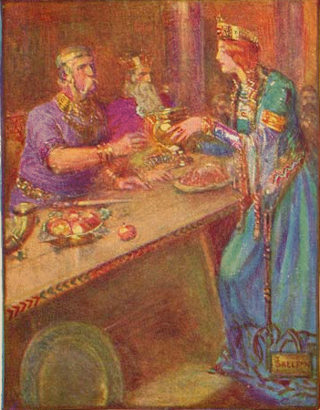
Offa is a semi-legendary king of the Angles in the genealogy of the kings of Mercia presented in the Anglo-Saxon Chronicle. He is the son of Wermund and the father of Angeltheow. His name is also mentioned in the Old English poem Widsith. He has been identified with Uffo, a legendary Danish king in the Gesta Danorum by Saxo Grammaticus, and the Gesta Danorum på danskæ.

Hrólfr Kraki, Hroðulf, Rolfo, Roluo, Rolf Krage was a semi-legendary Danish king who appears in both Anglo-Saxon and Scandinavian tradition.

Hrothgar was a semi-legendary Danish king living around the early sixth century AD. Many years later, Hrothgar paid money to the Wulfings to resolve a blood feud they had with Ecgtheow, Beowulf's father.
Various gods and men appear as sons of Odin in Old Norse and Old English texts.

Halga, Helgi, Helghe or Helgo was a legendary Danish king living in the early 6th century. His name would in his own language (Proto-Norse) have been *Hailaga.

Halfdan Ragnarsson was a Viking leader and a commander of the Great Heathen Army which invaded the Anglo-Saxon kingdoms of England, starting in 865.
The Gewisse were a tribe or ruling clan of the Anglo-Saxons. Their first location, mentioned in early medieval sources was the upper Thames region, around Dorchester on Thames. However, some scholars suggest that the Gewisse had origins among the ancient Britons at Cair-Caratauc in Wiltshire. According to Saxon folklore, the Gewisse were the founders of the kingdom of Wessex.
The Myrgings were a clan and people of Saxon origin who, together with their king Eadgils, are only mentioned in the Old English poem Widsith. They are mentioned as the people of the scop Widsith. They appear to have been the neighbours of the Angles and Offa of Angel, who was involved in a war against them. Perhaps they were a dynasty or clan competing for power with Offa over the rule of the Angles, though Offa slew two Myrging princes, probably the sons of Eadgils ; this Eadgils was later killed by Ket and Wig, the sons of Freawine, a governor of Schleswig who challenged Eadgils to combat while he was pillaging in the Angle lands. Freawine was killed in combat and the Myrgings may then have overrun Schleswig, as they are said to have settled or had holdings at Schleswig, though they were eventually defeated by Offa, who extended the boundary with them to Fifeldor.

Wermund, Vermund or Garmund is an ancestor of the Mercian royal family, a son of Wihtlaeg and father of Offa. The Anglo-Saxon Chronicle makes him a grandson of Woden, but the Gesta Danorum written by Saxo Grammaticus goes no further than his father, while the Brevis Historia Regum Dacie of Sven Aggesen makes Wermund son of king Frothi hin Frokni.

The Angles were a dominant Germanic tribe in the Anglo-Saxon settlement of Britain, and gave their name to the English, England and to the region of East Anglia. Originally from Angeln, present-day Schleswig-Holstein, a legendary list of their kings has been preserved in the heroic poems Widsith and Beowulf, and the Anglo-Saxon Chronicle.
Freawaru, introduced in l. 2020 of the poem Beowulf, is the daughter of King Hroðgar and Queen Wealhþeow.
The dog king is a Scandinavian tradition which appears in several Scandinavian sources: Chronicon Lethrense, Annals of Lund, Gesta Danorum, Heimskringla, Hversu Noregr byggðist and probably also in Skáldatal.
Ingeld or Ingjaldr was a legendary warrior who appears in early English and Norse legends. Ingeld was so well known that, in 797, Alcuin wrote a letter to Bishop Higbald of Lindisfarne questioning the monks' interest in heroic legends with: 'Quid enim Hinieldus cum Christo?' - What has Ingeld to do with Christ?
Hrœrekr Ringslinger or Ringscatterer was a legendary 7th-century king of Zealand or Denmark, who appears in Gesta Danorum, Gesta Danorum på danskæ, Sögubrot, Njáls saga, Hversu Noregr byggðist, Skjöldunga saga, and Bjarkarímur. Connection with such historical figures such as Horik I, who ruled Denmark around 854 for a dozen or so years, or the founder of the Rurik dynasty is fraught with difficulty.
Wihtlæg, Whitlæg, Wighlek, Wiglecus, Wiglek, Witlac or Viglek is a legendary king of either Denmark or Angeln in Germanic legends. He is known in Saxo's kings of Denmark by the name of Vigletus.
Feng was a legendary Jutish chieftain and the prototype for William Shakespeare's King Claudius. He appears in Saxo Grammaticus' Gesta Danorum and Gesta Danorum på danskæ.
Freawine, Frowin or Frowinus figures as a governor of Schleswig in Gesta Danorum and in the Anglo-Saxon Chronicle as an ancestor of the kings of Wessex, but the latter source only tells that he was the son of Friðgar and the father of Wig.
A number of royal genealogies of the Anglo-Saxon kingdoms, collectively referred to as the Anglo-Saxon royal genealogies, have been preserved in a manuscript tradition based in the 8th to 10th centuries.

The West Saxon Genealogical Regnal List is the name given in modern scholarship to a list of West-Saxon kings. It is one of the main sources for understanding the early history of Wessex and the attempts of its dynasties to project an image of dynastic stability.







